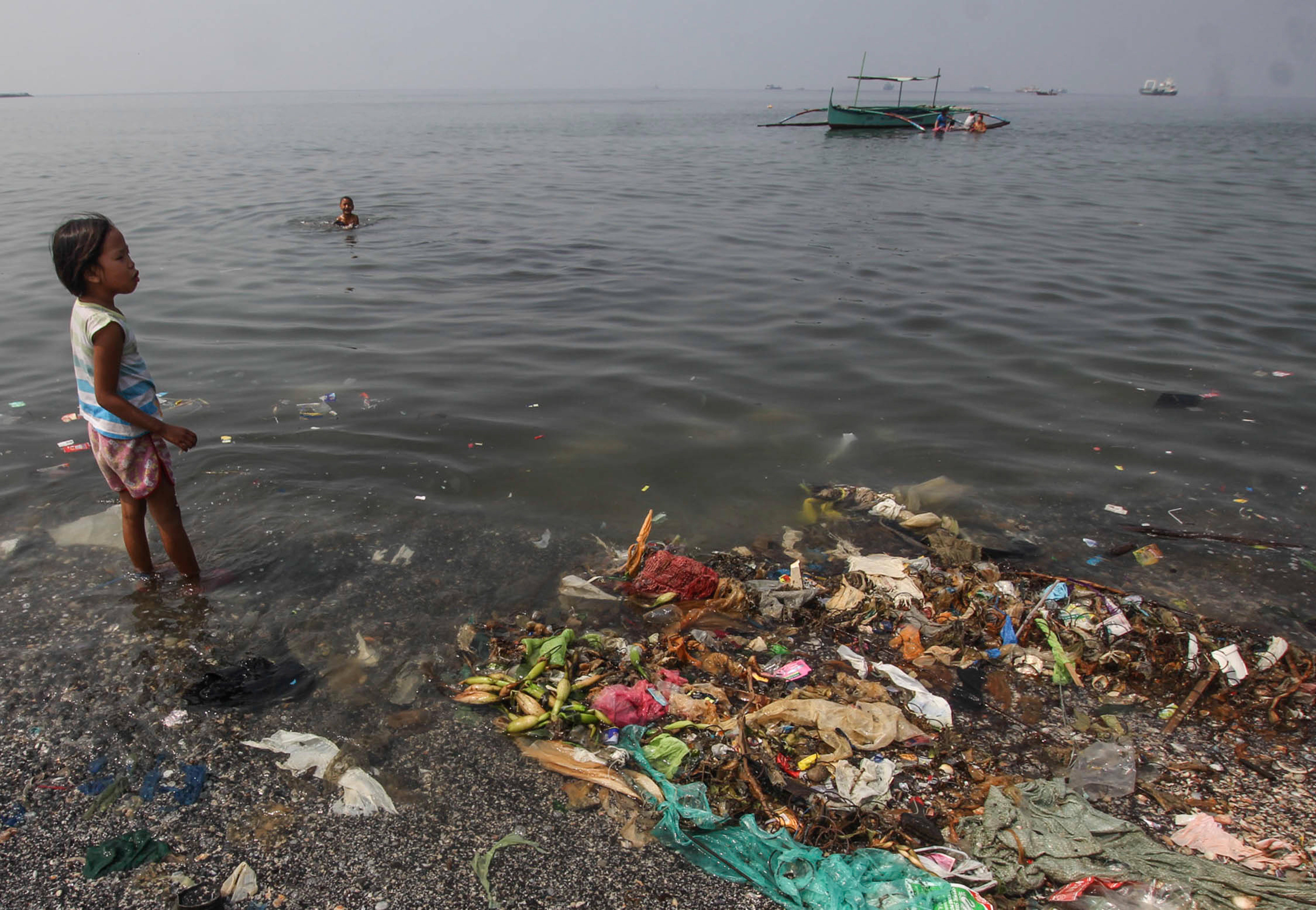PH fights plastic blight

DESPOILED ROTTEN A girl gazes at the polluted waters of Manila Bay along the Baseco Compound in Tondo, Manila, in this March 2019 photo. According to the United Nations Environment Programme, the Philippines is “one of the world’s worst offenders on marine plastic pollution.” —Inquirer file photo
MANILA, Philippines — The crisis of unsustainable consumption and production worldwide is exacerbating various other ills, from climate change to nature loss and pollution.
Countries have seen varying levels of progress in their efforts toward achieving Sustainable Development Goal 12, which is all about ensuring sustainable consumption and production patterns.
According to the United Nations, “to ensure sustainable consumption and production practices necessarily entails to respect the biophysical boundaries of the planet and to reduce current global consumption rates in order to fit with the biophysical capacity to produce ecosystem services and benefits.”
READ: Ending global plastic pollution
In other words, in a sustainable or circular economy, “products and materials are designed in such a way that they can be reused, remanufactured, recycled or recovered and thus maintained in the economy for as long as possible, along with the resources of which they are made, and the generation of waste, especially hazardous waste, is avoided or minimized, and greenhouse gas emissions are prevented or reduced.”
Worst offender
When it comes to SDG 12, the Philippines is ranked 92nd out of the 166 countries in the UN’s Sustainable Development Report. Scores are stagnating or increasing at less than half of the required rate for some indicators, including managing municipal solid waste, production-based air pollution, and exports of plastic waste.
The UK-based organization Utility Bidder identified the Philippines in October 2023 as the world’s largest contributor of plastic pollution in the oceans, an assessment shared by SEA circular, an initiative of the UN Environment Programme and the Coordinating Body on the Seas of East Asia, which has warned that the Philippines “is one of the world’s worst offenders on marine plastic pollution, with 0.28-0.75 million tons per year of plastic entering to oceans from coastal areas in Manila Bay. The country uses almost 60 billion sachets a year. Economic growth, combined with enhanced production and consumption, is leading to higher waste generation” in the country.
Legislation that supports responsible waste management goes as far back as 2000 with Republic Act (RA) No. 9003, or the Ecological Solid Waste Management Act of 2000. The law provides for a comprehensive ecological solid waste management program by creating the necessary institutional mechanisms and incentives, appropriating funds, declaring certain acts prohibited, and providing penalties.
It outlines basic policies and general provisions that ensure the protection of not just the environment but of public health. These include provisions that ensure the proper segregation, collection, transport, storage, treatment, and disposal of solid waste in accordance with “ecologically sustainable development principles” and “environmentally sound methods that maximize the utilization of valuable resources and encourage resource conservation and recovery.”
At the 23rd signing anniversary of RA 9003, speakers highlighted the impacts made in waste management since the implementation of the law—from the establishment of materials recovery facilities to the promotion of waste segregation at source. But, clearly, the law has not been enough to address the problem of waste pollution in the country.
Action plan
Another policy, this time specifically addressing the goals of SDG 12, was recently put together. In 2023, the National Economic and Development Authority, along with the Asian Development Bank and various government agencies, the business sector, academia, and civil society, formulated the Philippine Action Plan for Sustainable Consumption and Production (PAP4SCP) to direct and promote sustainable behavior and practices across all governmental levels and industries. It was also formulated to identify concrete interventions to address issues created by the production and consumption of goods and services, especially their impact on the environment and the economy.
Using a participatory and consultative process to ensure a whole-of-society approach, the plan envisions having more Filipinos produce and consume green goods and services to accelerate the shift toward sustainable and climate-smart practices and lifestyles that contribute to the country’s more long-term vision of a “matatag, maginhawa, at panatag na buhay” (stable, comfortable, and secure life).
The action plan also maps out how the attainment of SCP will not only deliver SDG 12 but also contribute significantly to the achievement of majority of the SDGs, such as SDG 3 (good health and well-being), SDG 6 (clean water and sanitation), SDG 7 (affordable and green energy), SDG 8 (decent work and economic growth), SDG 9 (industry, innovation, and infrastructure), and SDG 11 (sustainable cities and communities), among others.
EPR law
In 2022, the Philippines also passed the Extended Producer Responsibility (EPR) Act, a law that amends the Ecological Solid Waste Management Act of 2000, requiring “Obliged Enterprises” or large product producers, under pain of penalty for noncompliance, to “reduce and/or recover for reuse, recycling, treatment, or proper ecological disposal the plastic packaging waste that they release or released to the domestic market.”
The objective is to ensure that “every amount of plastic product footprint created, an equivalent amount thereof is recovered or removed from the environment by the product producers through an efficient waste management system.” The ultimate target is by 2028 and thereafter, at least 80 percent of the enterprises’ plastic waste is recovered, reused, or disposed of properly.
Sources: Inquirer Archives, sdgs.un.org, dashboards.sdgindex.org, sustainabledevelopment.un.org, officialgazette.gov.ph, emb.gov.ph, neda.gov.ph